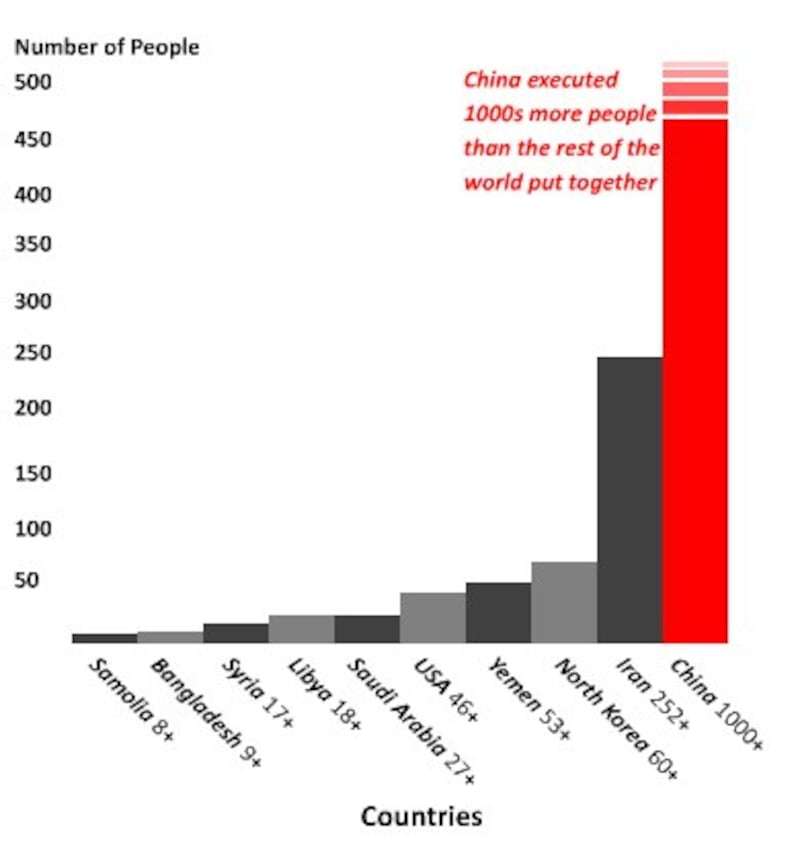China is thought to have executed thousands of people in 2010, more than the rest of the world combined, according to a new report from Amnesty International.
While the use of the death penalty declined in most countries in 2010, China was the exception, the group said in its Death Sentences and Executions in 2010 report.
"Amnesty officially recorded 527 executions in 23 countries—down from at least 714 executions in 2009," the group said in a statement on its website.
"However, these minimum figures do not take full account of China, where thousands are believed to be executed every year and where the authorities remain highly secretive about its use."
U.S.-based rights activist Liu Nianchun said he believes the estimate of "thousands" executed in China in 2010 isn't exaggerated.
"I think this is likely to be accurate," Liu said. "There has been no decrease in the number of executions in China."
However, he said the use of the death penalty hasn't improved social stability, citing Beijing's spending on domestic security, which rose this year to 624.4 billion yuan (U.S. $94.7 billion), compared with the People's Liberation Army budget of 601.1 billion yuan (U.S. $91.2 billion).
"China is still a dangerous place," he said.
'A wide range of crimes'

Amnesty said China continued to use the death penalty "extensively against thousands of people for a wide range of crimes that include nonviolent offenses and after proceedings that did not meet international fair trial standards."
New Supreme Court guidelines in February 2010 said the death penalty should be "resolutely" applied for extremely serious crimes in which there is plenty of high-quality evidence.
Recent government policy requires that courts should treat repeat offenders with severity while they treat minors and the elderly with leniency, and that commutations should be limited in the cases of those convicted of violent crimes such as murder, robbery, and rape.
U.S.-based scholar Zhu Xueyuan said, though, that the current rate of executions is far lower than at any other time in Chinese history.
"The Chinese Communist Party has begun to realize that you can't execute people for nonviolent crimes," Zhu said. "This hadn't been widely recognized in China for the past few thousand years."
Zhu said China's huge population has given rise to large numbers of violent crimes within its borders, however.
"The priority right now isn't to look only at the numbers: it's to solve the problem of the death penalty for nonviolent crimes."
Zhu said China could follow the lead of the United States, which had reduced its use of the death penalty over the years.
Call for transparency
Amnesty International's Hong Kong director, Milabel Cristobal Amar, called on Beijing to make public the number of executions it carries out.
"If the Chinese government believes that it has made progress on the issue of executions, then it should publish this information openly, for people to look at," she said.
"This would allow some debate on the matter."
Liu said there is often a political reason for China's use of the death penalty.
"Whenever you have a political movement ... more people are executed than would normally have been," Liu said. "This doesn't raise an eyebrow within the ranks of the Communist Party."
He said that China's lack of an independent judiciary has also contributed to the numbers of people executed.
"The judiciary ... mostly has to follow the requirements of the local Communist Party law enforcement committee in its decisions about whether to order the death penalty," he said.
"If the final decision on death penalties doesn't [in practice] lie with the Supreme Court, then wrongful convictions become more likely, especially during political movements like the Strike Hard campaign of 1983," Liu added.
Trend toward abolition
Amnesty said the underlying global trend on the death penalty runs "strongly toward abolition," with 31 countries having abolished the punishment in law or in practice in the last 10 years alone.
However, the report said that North Korea executed at least 60 people in 2010, and that the authorities often imposed the death penalty arbitrarily and were more frequently staging public executions.
In Southeast Asia, Laos said it was "not ready to abolish this capital punishment as it is an effective deterrent to most serious offenses, especially drug trafficking," although the country had upheld a moratorium for some years.
In Vietnam, information about executions is classified as a state secret, Amnesty said, citing reports of 34 separate death sentences throughout the year.
Amnesty said that Vietnam's National Assembly adopted a law in June replacing the firing squad with lethal injection as the method of execution, effective from July 2011.
Cambodia has no death penalty in law, while Burma reported no judicial executions for more than a decade, said the report, which did not cover extrajudicial killings.
Reported by Yang Jiadai and Li Tong for RFA's Mandarin service, and by Grace Kei Lai-see for the Cantonese service. Translated and written in English by Luisetta Mudie.
